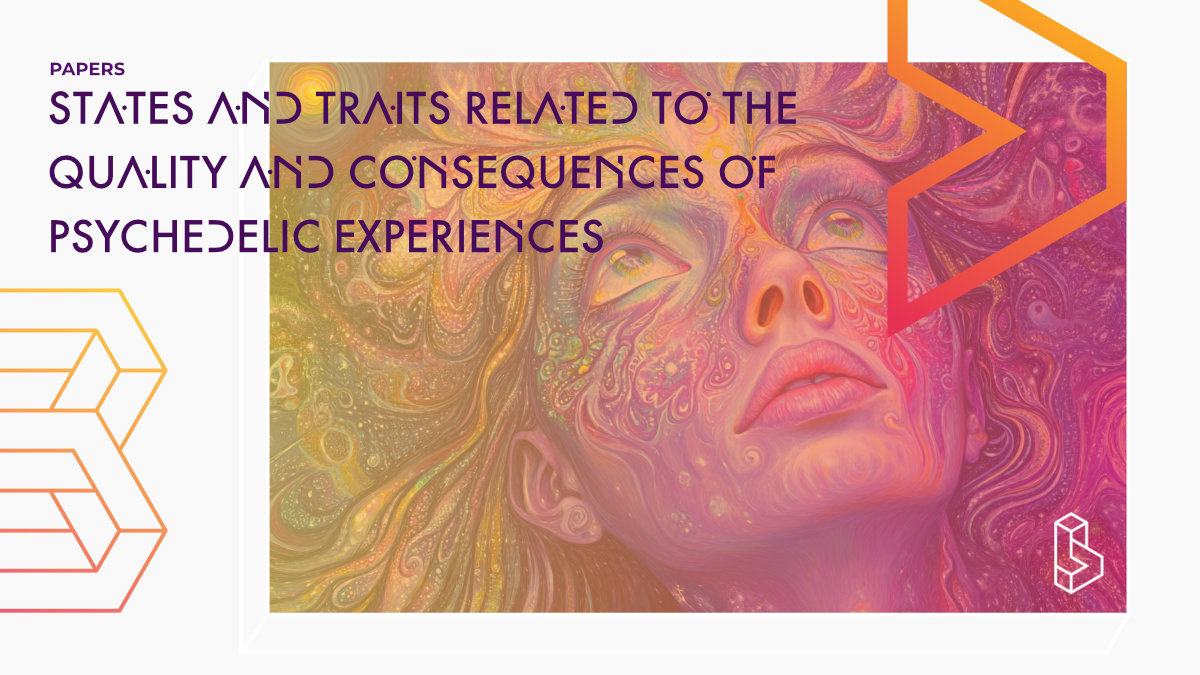This retrospective survey (n=143) of Amazon Mechanical Turk participants who self-administered psilocybin identifies factors related to mystical experiences (MEs) and challenging experiences. The study finds a state of surrender predicts MEs, while preoccupation predicts challenging experiences, explaining 66% and 56% of the variance in ME and dread scores, respectively. Mystical experiences during the session also relate to long-term positive changes.
Abstract of States and traits related to the quality and consequences of psychedelic experiences
“Many individuals experience significant positive psychological change after ingesting psychedelic agents such as psilocybin, LSD, and ayahuasca, but some do not. Such changes appear to be mediated by definable and measurable mystical experiences (MEs) during the psychedelic session, which have been shown in previous research (e.g., Griffiths, Richards, McCann, & Jesse, 2006) to be related to long-term positive personal change. Individual responses to psychedelic agents are characteristically difficult to predict, however, necessitating improved identification of predictors to (a) reduce the possibility of significant challenging experiences and sequelae and (b) increase the possibility of MEs and long-term beneficial outcomes. Our study utilized crowdsourced retrospective survey data from 143 Amazon Mechanical Turk participants who self-administered psilocybin in the past year to identify factors related to MEs and/or challenging experiences. The best performing regression model explained 66% of the variance in ME scores on the 30-item Mystical Experience Questionnaire (MacLean, Leoutsakos, Johnson, & Griffiths, 2012) and 56% of the variance in scores on the dread subscale of the Sacred Emotions Scale (Burdzy, 2014). A state of surrender at the start of the psilocybin session most strongly explained MEs, and a state of preoccupation most strongly explained challenging experiences. The trait absorption was a strong secondary predictor in both models, along with smaller predictors. Additionally, the occurrence of MEs during the psilocybin session explained long-term positive change. Based on these findings, the presented models appear to provide a powerful framework for explaining the immediate quality and long-term consequences of psychedelic experiences. Limitations as well as implications for therapeutic applications are discussed.“
Authors: Suzanne L. Russ, Robin L. Carhart-Harris, Geoffrey Maruyama & Melody S. Elliott
Summary of States and traits related to the quality and consequences of psychedelic experiences
Psychedelic agents such as psilocybin, LSD, and ayahuasca have been shown to produce significant positive psychological changes in some individuals, even after just one or two treatment sessions. These changes can persist for over a year after the compound has left the body. Such findings challenge conventional models of pharmacological interventions for mental illness and theories about the stability of personality traits.
The occurrence of mystical experiences (MEs) during psychedelic sessions appears to be a crucial factor in producing these positive outcomes. MEs are characterised by specific elements including unity, transcendence of time and space, positive mood, sense of sacredness, noetic quality, and ineffability. Research has shown that MEs during psychedelic sessions mediate reductions in depression, anxiety, and enhance feelings of well-being and spirituality.
However, MEs are not always a consistent feature of psychedelic experiences. Some individuals may experience challenging emotions such as anxiety during their sessions. The duration, rather than intensity, of these challenging experiences appears to be associated with less positive or more negative long-term psychological consequences.
To maximise the benefits of psychedelic treatment, it is essential to determine the preconditions that foster MEs and minimise challenging reactions. While much has been written about optimal conditions for positive psychedelic experiences, the individual and combined impact of various variables on the quality of these experiences and their long-term effects have rarely been systematically studied.
Method
Participants
Find this paper
States and traits related to the quality and consequences of psychedelic experiences
https://doi.org/10.1037/cns0000169
Open Access | Google Scholar | Backup | 🕊
Cite this paper (APA)
Russ, S. L., Carhart-Harris, R. L., Maruyama, G., & Elliott, M. S. (2019). States and traits related to the quality and consequences of psychedelic experiences. Psychology of Consciousness: Theory, Research, and Practice, 6(1), 1.
Study details
Compounds studied
Psilocybin
Topics studied
Personality
Healthy Subjects
Study characteristics
Survey
Participants
143
Humans

